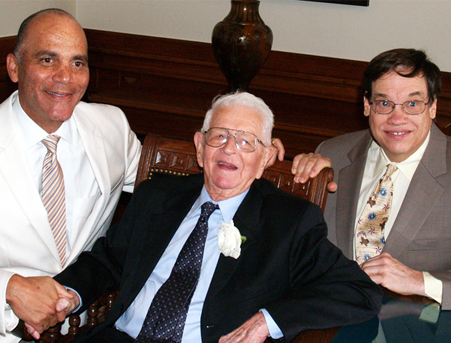© 2013 The Texas Lawbook.
Special to The Texas Lawbook
AUSTIN (April 18) – Retired Texas Chief Justice Jack Pope, who helped establish formal judicial education for Texas judges, fought for a voluntary judicial-ethics code when judges had none and fought again to make that code mandatory and enforceable, stood before the dais Thursday in the Texas House.
Each legislative session for the past several, Jack Pope was here for special recognition and a legislative resolution commending his service to the state on his birthday.
Thursday was different.
Jack Pope celebrated his 100th birthday.

With 38 years on trial and appellate benches, his judicial tenure as a whole is the longest of any sitting Texas Supreme Court justice in history. He is the oldest living former state chief justice and research indicates, at 100, he’s the oldest in history.
Clutching his metal cane, a steadying companion for a man who celebrated his birthday four years ago by walking 9.6 miles near his home in the West Austin hills, the former chief justice entered the House chamber with Chief Justice Wallace B. Jefferson on his left arm. With Pope’s white hair and square features, he appeared not much different from when he retired from the Supreme Court in January 1985.
“I continue to walk a half mile each day,” he said earlier in the day. Then he added: “But I’m a sorry walker.”
Introducing him to his House colleagues, state Rep. Dan Branch of Highland Park, who clerked for Pope in 1983-84, alluded to Pope’s diminutive stature. “As you see, he’s not the tallest judge in Texas,” Branch told the chamber. “But today he stands taller than any other judge in Texas history.”
On the House floor state representatives and spectators in the gallery stood and applauded.
Pope rose twice to express his thanks.
Click to see the tribute on the Texas Supreme Court website.
As a court of appeals justice, Pope’s reassessment of water rights conveyed by Spanish and Mexican land grants changed Texas water law forever. As chief justice he forged a way to guarantee income to finance legal assistance for the poor. Concerned with double litigation in the same case, he won legislative support for statutory changes to thwart “forum shopping” for favorable judges.
“I’m a common-law lawyer,” he proudly proclaims. “And I was a common-law judge.”
During the quarter-hour House ceremony Jefferson and Justice Nathan L. Hecht took turns reading congratulatory letters from retired U.S. Supreme Court Justice Sandra Day O’Connor; from justices of the U.S. Supreme Court; from President Barack Obama and Michelle Obama; and from former presidents and their wives, George W. and Laura Bush, Bill and Hillary Clinton and George H.W. and Barbara Bush.
Pope’s two sons, Andrew Jackson Pope III of Corpus Christi and Walter Allen Pope of Austin, and other relatives were in the House chamber gallery. Standing behind him were former and current Texas Supreme Court justices, members of the Court of Criminal Appeals, Senior U.S. Circuit Judge Patrick Higginbotham and U.S. District Judge Lee Yeakel of Austin.
The sweep of his reforms and his opinions changed Texas law forever, said Austin attorney Steve McConnico, a former law clerk. “What he did for trial practitioners, there’s no way to measure it,” McConnico said.
Senior Judge Thomas M. Reavley, a former Texas Supreme Court justice now on the U.S. Court of Appeals for the Fifth Circuit, did not hesitate to name the model jurist among hundreds he served with over a more than 50-year judicial career, including judges on all but one of the 11 federal regional circuits.
“Jack Pope,” he said in an interview last summer. “No question about it.”
© 2013 The Texas Lawbook. Content of The Texas Lawbook is controlled and protected by specific licensing agreements with our subscribers and under federal copyright laws. Any distribution of this content without the consent of The Texas Lawbook is prohibited.
If you see any inaccuracy in any article in The Texas Lawbook, please contact us. Our goal is content that is 100% true and accurate. Thank you.
